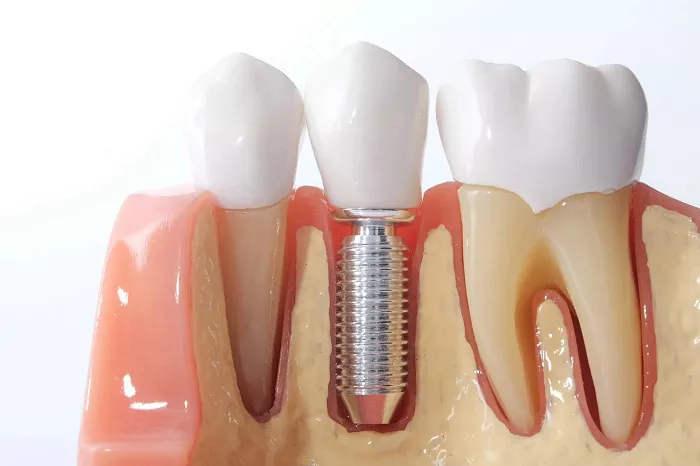Dental implants have become a popular and effective solution for replacing missing teeth. They offer a durable, natural-looking, and functional alternative to traditional dentures and bridges. However, one of the most common questions patients ask is: How long should a dental implant last? The answer depends on several factors, including the quality of the implant, the skill of the dentist, and the patient’s oral hygiene habits. This article will provide a detailed guide to understanding the lifespan of dental implants and how to maximize their longevity.
What Are Dental Implants?
Dental implants are artificial tooth roots made of biocompatible materials, typically titanium. They are surgically placed into the jawbone to support replacement teeth, such as crowns, bridges, or dentures. Implants consist of three main components:
The Implant: A screw-like post that integrates with the jawbone.
The Abutment: A connector that attaches the implant to the replacement tooth.
The Crown: The visible part of the implant that mimics a natural tooth.
How Long Should a Dental Implant Last?
The lifespan of a dental implant varies depending on several factors. On average, a well-maintained dental implant can last 20 to 30 years or even a lifetime. However, the crown attached to the implant may need replacement every 10 to 15 years due to normal wear and tear. Here’s a breakdown of the factors that influence implant longevity:
Quality of the Implant
High-quality implants made from medical-grade titanium or zirconia are designed to last longer. Cheaper, low-quality implants may fail prematurely.
Skill of the Dentist
The success of an implant depends on the dentist’s expertise and experience. A skilled dentist ensures proper placement and alignment, reducing the risk of complications.
Patient’s Oral Hygiene
Good oral hygiene is crucial for the longevity of dental implants. Poor hygiene can lead to infections, gum disease, and implant failure.
Bone Density and Jaw Health
Adequate bone density is necessary to support the implant. Patients with bone loss may require bone grafts before implantation.
Lifestyle Habits
Habits like smoking, teeth grinding, or chewing hard objects can shorten the lifespan of dental implants.
Overall Health
Conditions like diabetes or autoimmune diseases can affect the healing process and implant integration.
Factors That Influence Implant Longevity
To better understand how long a dental implant should last, let’s explore the key factors that influence its lifespan in more detail.
Osseointegration
Osseointegration is the process by which the implant fuses with the jawbone. Successful osseointegration is essential for implant stability and longevity. This process typically takes 3 to 6 months.
Oral Hygiene
Maintaining excellent oral hygiene is critical for preventing peri-implantitis, a condition similar to gum disease that can lead to implant failure. Brush and floss regularly, and visit your dentist for professional cleanings.
Regular Dental Check-Ups
Routine dental visits allow your dentist to monitor the health of your implant and address any issues early. Early detection of problems can prevent complications and extend the implant’s lifespan.
Proper Placement
The implant must be placed in the correct position and angle to ensure even distribution of chewing forces. Improper placement can lead to implant failure.
Quality of the Crown
The crown attached to the implant is subject to wear and tear. High-quality materials like porcelain or zirconia can extend the crown’s lifespan.
How to Maximize the Lifespan of Dental Implants
While dental implants are designed to be long-lasting, their longevity depends on proper care and maintenance. Here are some tips to help you get the most out of your dental implants:
Practice Excellent Oral Hygiene
Brush your teeth at least twice a day with a soft-bristled toothbrush.Floss daily to remove plaque and food particles from around the implant.Use an antibacterial mouthwash to reduce the risk of infection.
Avoid Harmful Habits
Quit smoking, as it can impair healing and increase the risk of implant failure.Avoid chewing on hard objects like ice or pens, which can damage the crown or implant.
Wear a Night Guard if Needed
If you grind your teeth at night, wear a night guard to protect the implant and surrounding teeth.
Maintain a Healthy Diet
A balanced diet rich in vitamins and minerals supports overall oral health and healing.Avoid excessive sugar, which can contribute to plaque buildup and gum disease.
Attend Regular Dental Check-Ups
Visit your dentist every 6 months for professional cleanings and examinations.Your dentist can detect and address any issues early, preventing complications.
Common Myths About Dental Implant Longevity
There are several misconceptions about dental implants that can lead to unrealistic expectations. Let’s debunk some of the most common myths:
Dental Implants Last Forever
While dental implants are designed to be long-lasting, they are not indestructible. Proper care and maintenance are essential for maximizing their lifespan.
Implants Don’t Require Maintenance
Dental implants require the same level of care as natural teeth, including regular brushing, flossing, and dental check-ups.
Implants Are Prone to Failure
With proper placement and care, dental implants have a success rate of over 95%. Most failures are due to poor oral hygiene or underlying health issues.
Conclusion
Dental implants are a durable and effective solution for replacing missing teeth, with the potential to last 20 to 30 years or more with proper care. Factors like the quality of the implant, the skill of the dentist, and the patient’s oral hygiene habits play a significant role in determining implant longevity. By practicing excellent oral hygiene, avoiding harmful habits, and attending regular dental check-ups, you can maximize the lifespan of your dental implants and enjoy a healthy, functional smile for years to come.

